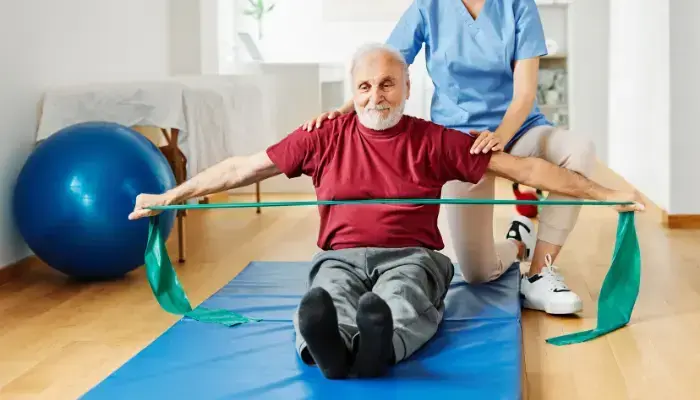Physical therapy can benefit people of all ages, but it’s especially valuable for older adults with mobility issues. Seniors often undergo physical therapy when they are rehabilitating from surgery, injury, or illness. Increasingly, adults also use physical therapy to prevent injury and preserve their independence as they age.
Unfortunately, the physical and mental demands of physical therapy can be challenging, leading some older adults to become discouraged or want to quit. This blog, curated by The Bristal team, shares why this happens and offers tips on how you can help provide motivation and support.
Why Older Adults Become Discouraged with Physical Therapy
Despite the obvious benefits of physical therapy, some older adults may become discouraged by the challenges they face with physical therapy, whether in a rehab center or at-home care. According to a study published in Manual Therapy on treatment adherence in physiotherapy, some of the reasons physical therapy patients struggle to continue their treatment include:- Not accustomed to exercising regularly
- Increased pain levels
- Depression/anxiety
- Poor social or family support
- Helplessness
There is good news, though! As a friend or family member, you can help improve their chances for success with physical therapy by providing support, motivation, and goal-setting.
Here’s how to encourage seniors to maintain their physical therapy regimen:
Remind Them of the Benefits of Physical Therapy
Some of the common benefits older adults gain from physical therapy (and physical activity in general) include:
- Reduced pain
- Better balance
- Stronger muscles
- Reduced stress and anxiety
- Healthy weight management
If they have pain concerns, remind them that the hard work will pay off when they can start enjoying life with less pain. If they’re craving independence, remind them that physical therapy will help keep them safer and stronger.
If they’re feeling weak, remind them that physical therapy will help them feel stronger. If they’re feeling anxious, remind them that completing physical therapy will help them gain more confidence when it’s time to return home.
Related: Learn why exercise really is worth it - and how to get started >>
Help Them Set Appropriate Goals

According to the Institute on Aging, an effective way to motivate older adults to stay active is to help them set small, incremental goals. Laying out a series of achievable, short-term goals can boost confidence and motivate them.
In setting short-term goals, be sure you’re being realistic. Don’t set unattainable goals. Instead, aim for smaller goals that lead to consistent progress. The physical therapist can assist you in determining which goals are appropriate.
To keep goals top of mind, try posting them where your family member can see them easily, like on the wall or refrigerator. You can create a chart or calendar for visual reminders. Or, if your family member would rather keep their goals more private, use a journal or diary to chart progress.
When your family member meets a goal, be sure to celebrate it! Treat them to something special or mark the occasion with some quality time together. Recognizing small victories and reaping the health benefits can help motivate them to continue.
Use Music to Motivate

Music can make us feel many emotions and even inspire motivation, making it useful in a physical therapy setting at home or a rehab center. Research suggests that music can increase enjoyment while improving athletic performance and lowering perceived exertion.
Thus, helping your family member find the right soundtrack to listen to during physical therapy can have multiple benefits. Explore different music genres with them to find out what inspires them, and then apply this to their physical therapy routine. You can also try building a playlist together of their favorite tunes or find an existing playlist on a digital platform.
Dancing is a fun way to keep older adults moving. If your family member enjoys any type of dancing, talk to the physical therapist about how to safely incorporate the musical movement into their exercise session.
Related: Get walking tips for older adults >>
Provide Moral Support
Offering your love and support is one of the most important ways you can help your family member succeed with physical therapy. You can do this in several ways, such as actively listening to them, taking them to and from physical therapy, exercising with them, and simply spending time together.
Also, remember that there will be good and bad days ― that’s normal. On the good days, lift their spirits with praise and affirmation, and on the difficult days, remind them just how far they’ve come and how proud you are that they keep going.
More Lifestyle Resources
If you found this article helpful, you can find more resources on similar topics in The Bristal Blog. Here are some useful tips to relieve arthritis pain naturally and how trying the MIND diet could improve your cognitive health.
This blog was originally published in 2022. It was updated in August 2024.



